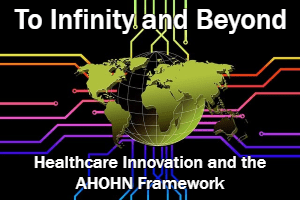To Infinity & Beyond: Healthcare Innovation and the All Hazards, One Health, One Nature Framework
Co-Authors: Maurice A. Ramirez, DO, PhD & Allison A. Sakara, NP, MSN, RN, PHRN
Government, industry, and non-profit organizations worldwide are shifting to the All Hazards, One Health, One Nature (AHOHN) Framework. This structure provides a common foundation for the development of goal-oriented and data-driven plans of action across countless areas of impact. Taking into account the interconnectedness of our entire ecosystem, the AHOHN Framework is giving rise to sweeping innovations and novel technologies to meet the unified needs of all living things. Soon, though, understanding the interrelationships between humans and their habitats will not be limited to a single planet. And the same AHOHN Framework already provides the basis for meeting the challenges of interplanetary existence. This article will discuss one of these challenges – providing healthcare to people and animals in off-Earth, austere environments.
Our knowledge of the effects of living off-Earth is limited. The only data we have collected comes from a small population of astronauts and cosmonauts, with an even smaller number who were ill or suffered an injury during their mission. While this data has been an essential first step, setting the standards for healthcare in space will require the study of much larger populations. The fact that knowledge from healthcare on Earth was extrapolated and adapted to provide healthcare in space is an important point. Once again, the AHOHN Framework reminds us that medicine and habitat remain interconnected, regardless of location. Is it possible that this approach will help us meet the challenges of interplanetary healthcare and benefit healthcare on Earth simultaneously?
Initially, the number of healthcare professionals traveling to the moon or Mars will be limited, as will the populations they serve. Some specialties, such as emergency-related providers, likely will be among the first to arrive. But the entire complement of healthcare providers accessible at even a small rural hospital will not. Existing technologies for telemedicine may be helpful if a provider’s help is needed for a patient on the moon, as the time delay for transmitting is short. However, consider a patient on Mars, where the round-trip time delay from question to answer can take 38 minutes even with ideal conditions. Waiting that long for expert instruction may be appropriate if the complaint is a simple skin rash but would never work for an emergency appendectomy. So how is this threat being addressed, and how will medicine on Earth adapt?
Enter the Artificial Intelligence-based Decentralized Interglobal Medical Expert (AI-DIMES). Yes, sci-fi fans, we really are talking about digital doctors and veterinarians. From their collective experience and research, international space agencies have already defined the essential aspects of space healthcare. These aspects have been incorporated into the step-wise progression of how AI-based systems can be employed to augment healthcare delivery and decrease disparities when on-site expertise is not available. Using this hybrid of care needs and data types, the information that an AI-DIMES would need to “understand” has been drafted as follows:
Information about an individual patient – medical records, test results, data from wearables (like a Fitbit or iWatch), data from devices (like a pacemaker or glucometer), etc.
Data compiled from a provider’s entire patient population – establishes a larger group that has something in common, such as environment or specialty diagnosis
Big Data analyses from Determinants of Health, Smart City, and Census data – adds the broad scope of disease and outcomes across environments, facilitating extrapolation to new environments (like space or other planets)
Access to current scientific literature and regulatory databases – provides the scope of disease tracking, outcomes, side effects, adverse events, failure modes, recalls, and advisories that are key to any healthcare system
Be able to advise healthcare providers and patients on possible diagnoses and treatment options (including likely outcomes) that fit the patient’s preferences and lifestyle – incorporates autonomy, choice, and informed decision-making
Functions as a digital healthcare provider with the ability to examine, diagnose, order tests, and provide treatment without human healthcare provider oversight or review – able to provide emergency medical back-up, augment the skillsets of trained providers and facilitate patient education
Healthcare professionals and governments strive to correct healthcare disparities, eliminate healthcare illiteracy, and compensate for provider shortages across planet Earth. True to the interdependency of an AHOHN Framework, solving the challenges of interplanetary healthcare will contribute to resolving these healthcare challenges. While a digital doctor may sound like science fiction, AI-based healthcare advances to meet the needs of space exploration and habitation make solutions like AI-DIMES inevitable.
About the Authors:
Maurice A. Ramirez, DO, PhD, is a physician and innovator with over a quarter century of service in emergency medicine, artificial intelligence, computing, regulatory affairs, and disaster response. Dr. Ramirez is the recipient of the Lifetime Achievement Award in Disaster Medicine and Co-Founder of the High Alert Institute.
Allison A. Sakara, NP, MSN, RN, PHRN, is a nurse practitioner with decades of experience in pediatrics, hematology/oncology, regulatory affairs, software as medical device (SaMD) consulting, and disaster response. Allison is the Co-Founder & Executive Director of the High Alert Institute.
The High Alert Institute is a 501c3 not-for-profit educational public charity dedicated to providing disaster readiness education and resources to unserved and underserved communities, industries, and charitable organizations in an All Hazards, One Health, One Nature Framework. Learn more about the High Alert Institute at www.HighAlertInstitute.org










